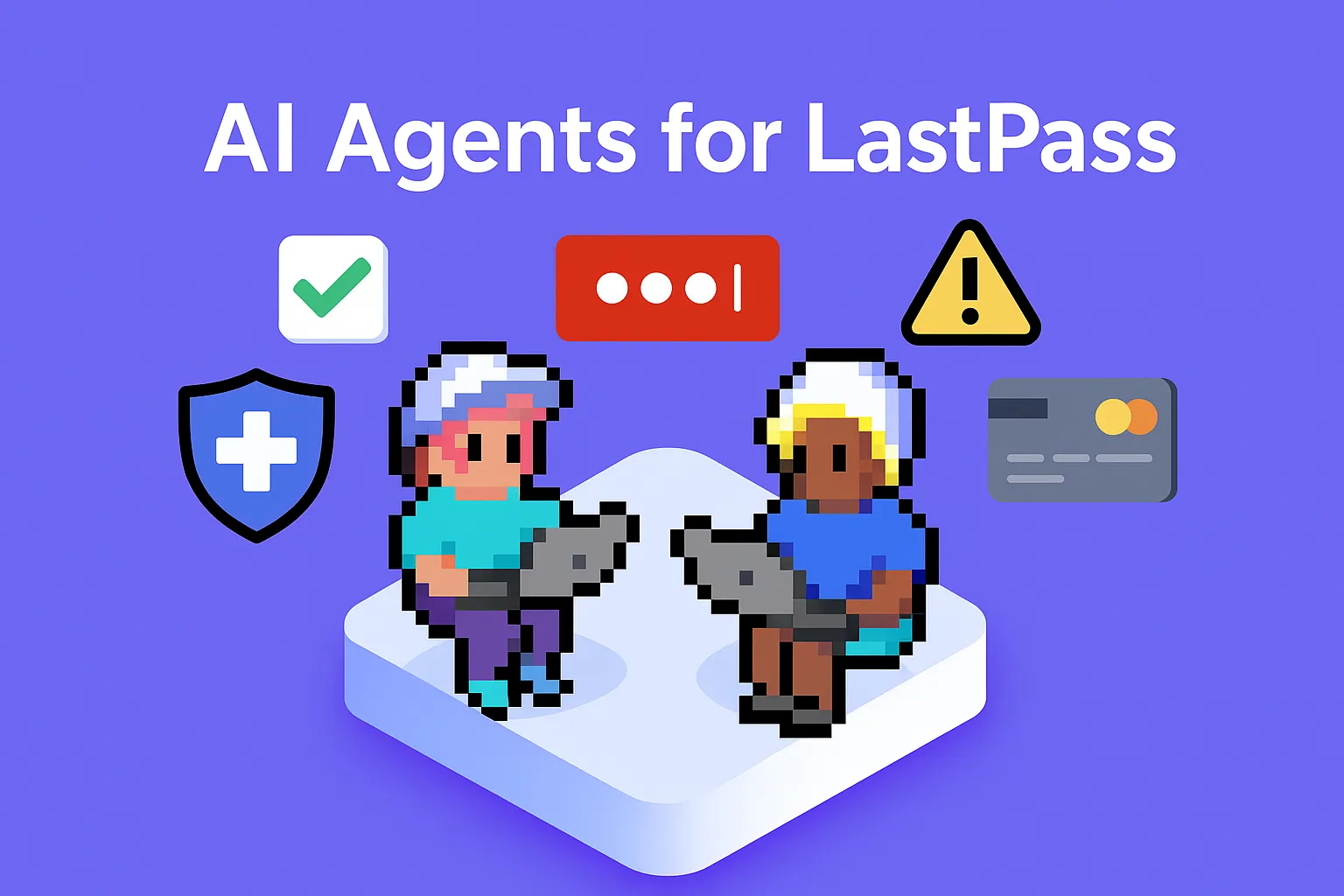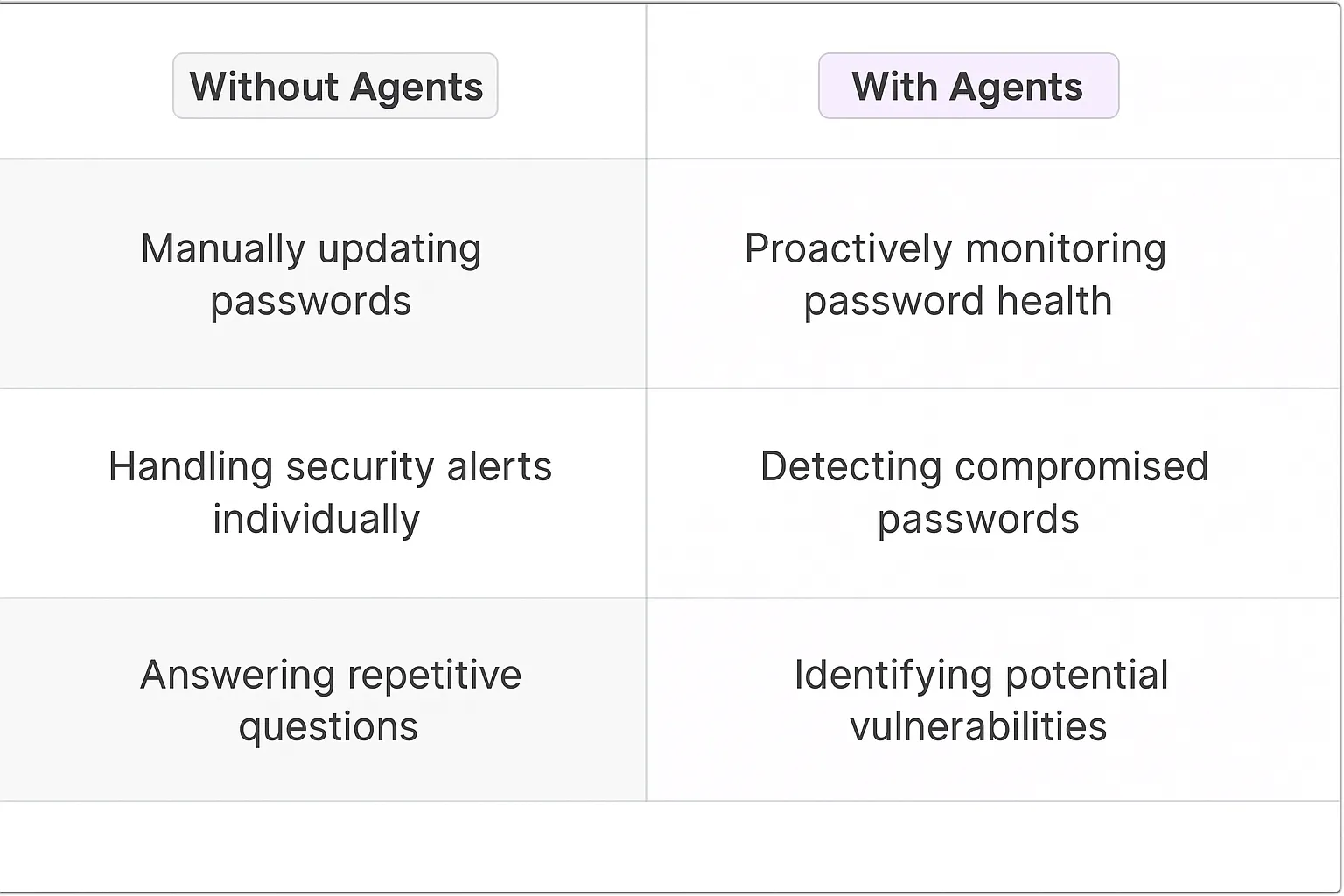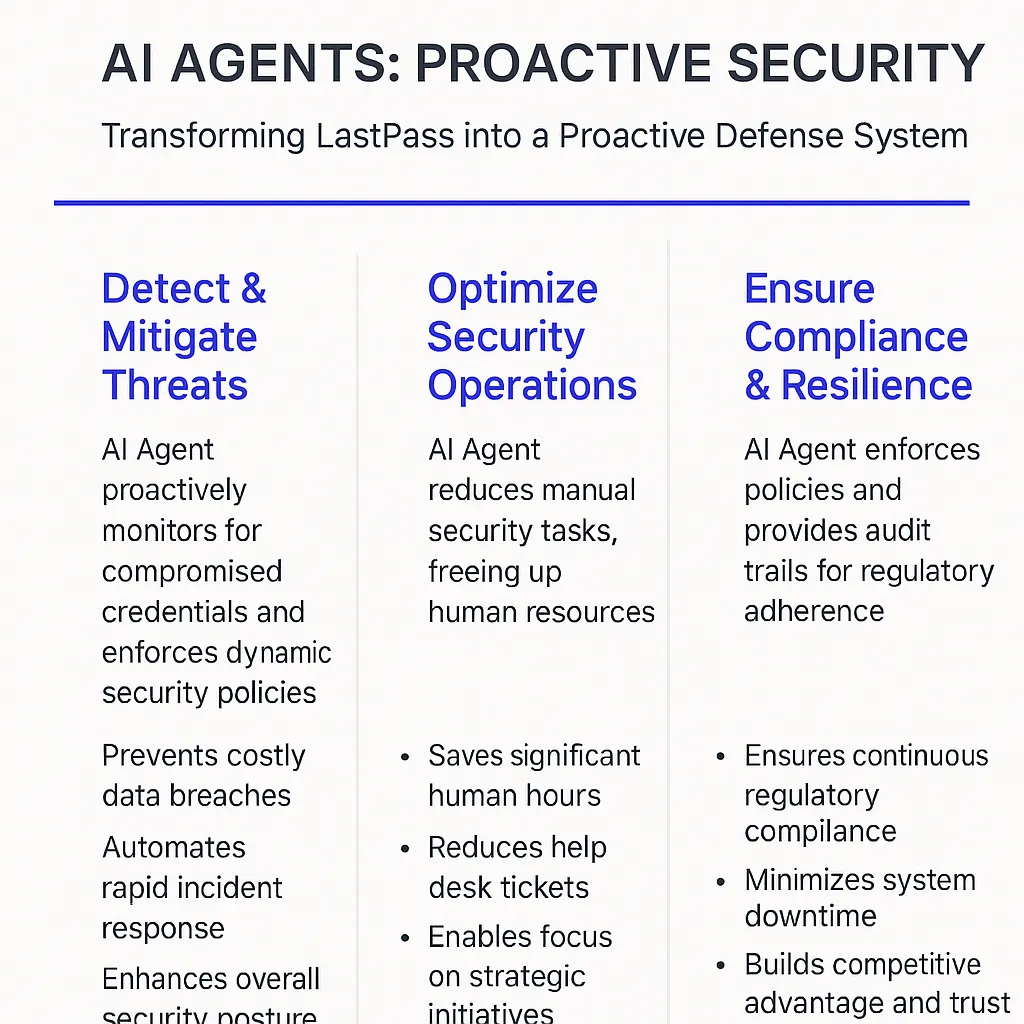LastPass
LastPass: A Zero-Knowledge Password Management Platform
What is LastPass?
LastPass stands as a leading password management platform that secures digital credentials through zero-knowledge encryption architecture. The platform enables organizations to manage passwords, share access securely, and maintain robust security policies across their digital infrastructure.
Key Features of LastPass
- Zero-knowledge encryption ensuring only users can access their credentials
- Secure password sharing capabilities for team collaboration
- Multi-factor authentication integration
- Password generation and strength monitoring
- Cross-platform synchronization
- Enterprise-grade security policies and controls

Benefits of AI Agents for LastPass
What would have been used before AI Agents?
Password management traditionally relied on manual processes and basic automation. Users had to individually input credentials, update passwords, and handle security alerts through LastPass's standard interface. Support teams fielded repetitive questions about password resets, account access, and security settings through conventional help desk channels.
What are the benefits of AI Agents?
AI Agents transform LastPass from a static password vault into a dynamic security partner. These digital teammates proactively monitor password health, detecting weak or compromised credentials before they become security risks. They analyze password patterns across organizations, identifying potential vulnerabilities that human administrators might miss.
The network effects are particularly compelling - as AI Agents learn from password management behaviors across thousands of users, they develop increasingly sophisticated models for threat detection. They can spot unusual login patterns that may indicate credential theft attempts, automatically triggering additional verification steps.
For enterprise environments, AI Agents automate complex password rotation schedules while maintaining compliance with security policies. They reduce the cognitive load on IT teams by handling routine password-related tasks and escalating only the most critical security issues that require human intervention.
The real breakthrough comes in user education. Rather than static documentation, AI Agents provide contextual security guidance, explaining potential risks and suggesting improvements based on each user's specific password habits. This creates a continuous feedback loop that gradually elevates an organization's security posture.
The scalability factor is significant - AI Agents can simultaneously monitor thousands of passwords across multiple platforms, maintaining consistent security standards while adapting to each organization's unique requirements. This level of personalized, automated security management was simply not feasible with traditional password management tools.

Potential Use Cases of AI Agents with LastPass
LastPass integration with AI agents creates powerful new capabilities for password management and security. The combination enables both enhanced protection and smoother workflows for teams and individuals managing their digital credentials.
Password Management & Security
- Automated password strength analysis with specific recommendations for improving weak credentials
- Proactive monitoring of compromised credentials across team members with instant alerts
- Smart password rotation scheduling based on security risk levels and compliance requirements
- Automated password updates across connected services when security threats are detected
Access Control & Permissions
- Dynamic access control that adjusts permissions based on user behavior patterns
- Intelligent grouping of shared credentials based on project teams and collaboration patterns
- Automated onboarding/offboarding credential management for team members
- Risk-based authentication that adapts security requirements to usage context
Security Compliance & Reporting
- Automated compliance reporting for password policies and security standards
- Real-time analysis of password sharing patterns to identify potential security risks
- Smart categorization of credentials based on sensitivity levels
- Automated documentation of access patterns for security audits
Productivity Enhancement
- Natural language requests for credential access and sharing
- Automated password updates across multiple services simultaneously
- Smart suggestions for password organization based on usage patterns
- Contextual credential suggestions based on active applications and websites
Integration Capabilities
AI agents can connect LastPass with other workplace tools to create seamless security workflows. The integration possibilities extend across identity management systems, HR platforms, and collaboration tools while maintaining strict security protocols.
When security incidents occur, AI agents can coordinate responses across multiple systems - from updating compromised credentials to notifying affected team members and documenting the incident for compliance purposes.
Implementation Considerations
Organizations implementing LastPass AI agents should focus on establishing clear security protocols and access policies. The AI needs proper configuration to balance security requirements with user experience. Regular audits of AI agent actions ensure alignment with security compliance while maintaining operational efficiency.

Industry Use Cases
AI agents integrated with LastPass transform how organizations handle password management and security across multiple sectors. The intersection of AI capabilities with LastPass's robust password infrastructure creates powerful new ways for teams to work securely while reducing friction. Let's explore how different industries leverage these digital teammates to enhance their security posture and operational efficiency.
The real power emerges when AI agents handle the complex choreography of password management - from generating ultra-secure credentials to orchestrating access controls across teams. For companies managing hundreds or thousands of logins, this shift from manual to AI-enhanced password management represents a fundamental upgrade in both security and productivity.
What makes this particularly compelling is how AI agents adapt to each industry's unique security requirements and compliance frameworks. Whether it's a healthcare provider dealing with HIPAA regulations or a financial institution adhering to SOX compliance, these digital teammates can be configured to align with specific security protocols while maintaining ease of use.
Healthcare Industry: Securing Patient Data with LastPass AI
Healthcare organizations face mounting pressure to protect sensitive patient information while managing an ever-growing number of digital systems and access points. A LastPass AI agent transforms how medical staff handle credentials and access electronic health records (EHRs) across multiple platforms.
When integrated into a hospital's workflow, the LastPass AI agent monitors login patterns and automatically detects potential security risks. For example, if a nurse practitioner typically accesses patient records from specific workstations during day shifts, the AI flags unusual login attempts from different locations or during off-hours.
The AI agent also adapts to the unique needs of different medical departments. In emergency medicine, where quick access is critical, it can temporarily adjust authentication requirements while maintaining security protocols. For specialists who work across multiple facilities, it creates secure, role-based access profiles that follow them between locations.
Beyond basic password management, the AI analyzes compliance requirements for HIPAA and other healthcare regulations. It proactively suggests password updates, manages access revocation for departed staff, and generates detailed audit trails - essential for both security and regulatory compliance.
The real power emerges in crisis scenarios. If a potential data breach is detected, the AI agent can instantly implement containment protocols, limiting access to critical systems while maintaining availability for essential medical services. This balanced approach ensures patient care isn't compromised while protecting sensitive data.
For healthcare IT teams, this level of intelligent security management reduces the administrative burden while strengthening the organization's security posture. The AI agent effectively becomes a digital security specialist, operating 24/7 to protect patient data and maintain regulatory compliance.
Financial Services: AI-Powered Password Security for Investment Firms
Investment firms manage billions in assets while juggling hundreds of trading platforms, financial databases, and client portals. The LastPass AI agent brings sophisticated pattern recognition to this complex environment, fundamentally changing how financial institutions approach security.
The AI agent learns the natural rhythm of trading desk operations. When portfolio managers access Bloomberg terminals at 6 AM before market open, that's normal. When someone tries to log into trading systems at 3 AM from an unknown location, the AI immediately escalates the threat.
What makes this particularly powerful for financial firms is the AI's ability to correlate access patterns with market events. During earnings seasons, it automatically adjusts authentication protocols for research teams pulling data from multiple sources. During quiet periods, it tightens security parameters and scrutinizes unusual access attempts more closely.
The agent also tackles the thorny challenge of client confidentiality. For wealth management teams handling ultra-high-net-worth clients, it creates dynamic security zones that automatically segment access based on client tiers and relationship manager roles. When advisors move between clients, the AI adjusts their access permissions in real-time.
Most impressively, the AI agent maps the complex web of regulatory requirements across different financial jurisdictions. It ensures SEC compliance for US operations while simultaneously maintaining adherence to GDPR for European clients and MAS regulations for Asian operations. This multi-regulatory awareness prevents costly compliance violations while keeping systems accessible.
For financial institutions, this level of intelligent security transforms password management from a vulnerability into a competitive advantage. The AI doesn't just protect access - it enables faster, more secure operations while maintaining the stringent security standards that financial regulators demand.
Considerations and Challenges
Implementing AI agents for LastPass requires careful navigation of security protocols, user authentication flows, and sensitive data handling. The intersection of password management and AI creates unique complexities that teams must address thoughtfully.
Technical Challenges
Password vault access presents the primary technical hurdle. AI agents need secure, controlled pathways to retrieve credentials while maintaining LastPass's zero-knowledge security model. This requires building sophisticated encryption handling capabilities and implementing robust authentication checks before any password access.
The agent must also handle LastPass's various data structures - from simple login credentials to secure notes and form fill profiles. Each type requires different parsing approaches and security considerations. Teams need to develop precise permission scoping to prevent unauthorized access to sensitive vault sections.
Security Implementation
Security remains paramount when extending AI capabilities to password management. The agent architecture must maintain LastPass's end-to-end encryption while enabling useful functionality. This includes:
- Implementing secure token handling for authentication
- Building audit trails for AI agent password access
- Creating granular controls for vault compartmentalization
- Developing fail-safes to prevent credential exposure
Operational Considerations
Organizations need clear policies governing AI agent password access. This includes defining which team members can grant permissions, establishing monitoring protocols, and creating incident response plans for potential security events.
User education becomes critical - teams must understand how to safely interact with AI agents accessing LastPass vaults. This requires developing training materials and best practices while maintaining compliance with security frameworks.
The integration also demands careful API rate limiting and load management to prevent service disruptions. Teams should implement robust error handling for scenarios like expired credentials or multi-factor authentication requests.
AI-Enhanced Password Management: The Future of Digital Security
The integration of AI Agents with LastPass marks a significant evolution in password management technology. These digital teammates don't just automate existing processes - they create entirely new capabilities for security enhancement and risk mitigation. Organizations implementing this technology gain both improved security posture and reduced operational overhead, while users benefit from seamless, intelligent password management that adapts to their needs.
The network effects of AI-enhanced password management will continue to grow as these systems learn from broader usage patterns and security incidents. For organizations serious about modern security infrastructure, the combination of LastPass and AI Agents represents a strategic advantage in managing digital access at scale.













